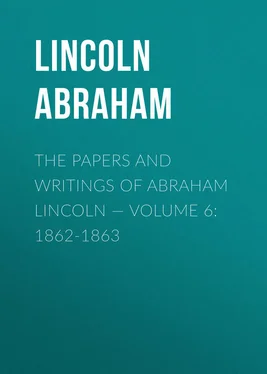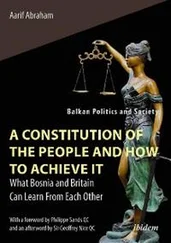Abraham Lincoln - The Papers And Writings Of Abraham Lincoln — Volume 6 - 1862-1863
Здесь есть возможность читать онлайн «Abraham Lincoln - The Papers And Writings Of Abraham Lincoln — Volume 6 - 1862-1863» — ознакомительный отрывок электронной книги совершенно бесплатно, а после прочтения отрывка купить полную версию. В некоторых случаях можно слушать аудио, скачать через торрент в формате fb2 и присутствует краткое содержание. Жанр: foreign_antique, foreign_prose, на английском языке. Описание произведения, (предисловие) а так же отзывы посетителей доступны на портале библиотеки ЛибКат.
- Название:The Papers And Writings Of Abraham Lincoln — Volume 6: 1862-1863
- Автор:
- Жанр:
- Год:неизвестен
- ISBN:нет данных
- Рейтинг книги:3 / 5. Голосов: 1
-
Избранное:Добавить в избранное
- Отзывы:
-
Ваша оценка:
- 60
- 1
- 2
- 3
- 4
- 5
The Papers And Writings Of Abraham Lincoln — Volume 6: 1862-1863: краткое содержание, описание и аннотация
Предлагаем к чтению аннотацию, описание, краткое содержание или предисловие (зависит от того, что написал сам автор книги «The Papers And Writings Of Abraham Lincoln — Volume 6: 1862-1863»). Если вы не нашли необходимую информацию о книге — напишите в комментариях, мы постараемся отыскать её.
The Papers And Writings Of Abraham Lincoln — Volume 6: 1862-1863 — читать онлайн ознакомительный отрывок
Ниже представлен текст книги, разбитый по страницам. Система сохранения места последней прочитанной страницы, позволяет с удобством читать онлайн бесплатно книгу «The Papers And Writings Of Abraham Lincoln — Volume 6: 1862-1863», без необходимости каждый раз заново искать на чём Вы остановились. Поставьте закладку, и сможете в любой момент перейти на страницу, на которой закончили чтение.
Интервал:
Закладка:
It is believed that this communication can be safely established either north or south of the Pamunkey River.
In any event, you will be able to prevent the main body of the enemy's forces from leaving Richmond and falling in overwhelming force upon General McDowell. He will move with between thirty-five and forty thousand men.
A copy of the instructions to General McDowell are with this. The specific task assigned to his command has been to provide against any danger to the capital of the nation.
At your earnest call for reinforcements, he is sent forward to co-operate in the reduction of Richmond, but charged, in attempting this, not to uncover the city of Washington; and you will give no order, either before or after your junction, which can put him out of position to cover this city. You and he will communicate with each other by telegraph or otherwise as frequently as may be necessary for efficient cooperation. When General McDowell is in position on your right, his supplies must be drawn from West Point, and you will instruct your staff-officers to be prepared to supply him by that route.
The President desires that General McDowell retain the command of the Department of the Rappahannock and of the forces with which he moves forward.
By order of the President: EDWIN M. STANTON, Secretary of War.
MAJOR-GENERAL GEORGE B. McCLELLAN, Commanding Army of the Potomac, before Richmond.
PROCLAMATION REVOKING GENERAL HUNTER'S ORDER OF MILITARY EMANCIPATION,
BY THE PRESIDENT OF THE UNITED STATES OF AMERICA:
A Proclamation
Whereas there appears in the public prints what purports to be a proclamation of Major general Hunter, in the words and figures following, to wit:
(General Orders No. 11) HEADQUARTERS DEPARTMENT OF THE SOUTH, HILTON HEAD, PORT ROYAL, S. C., May 9, 1862.
"The three States of Georgia, Florida, and South Carolina, comprising the military department of the South, having deliberately declared themselves no longer under the protection of the United States of America, and having taken up arms against the said United States, it became a military necessity to declare martial law. This was accordingly done on the 25th day of April, 1862. Slavery and martial law in a free country are altogether incompatible. The persons in these three States: Georgia Florida, and South Carolina — heretofore held as slaves are therefore declared forever free.
"By command of Major-General D. Hunter: "(Official.)ED. W. SMITH, "Acting Assistant Adjutant-General."
And whereas the same is producing some excitement and misunderstanding: therefore,
I, Abraham Lincoln, President of the United States, proclaim and declare that the Government of the United States, had no knowledge, information, or belief of an intention on the part of General Hunter to issue such a proclamation; nor has it yet any authentic information that the document is genuine. And further, that neither General Hunter nor any other commander or person has been authorized by the Government of the United States to make a proclamation declaring the slaves of any State free; and that the supposed proclamation now in question, whether genuine or false, is altogether void so far as respects such a declaration.
I further make known that whether it be competent for me, as commander-in-chief of the army and navy, to declare the slaves of any State or States free, and whether, at any time, in any case, it shall have become a necessity indispensable to the maintenance of the government to exercise such supposed power, are questions which under my responsibility I reserve to myself, and which I cannot feel justified in leaving to the decision of commanders in the field.
These are totally different questions from those of police regulations in armies and camps.
On the sixth day of March last, by special message, I recommended to Congress the adoption of a joint resolution, to be substantially as follows:
Resolved, That the United States ought to co-operate with any State which may adopt gradual abolishment of slavery, giving to such State pecuniary aid, to be used by such State, in its discretion, to compensate for the inconvenience, public and private, produced by such change of system.
The resolution in the language above quoted was adopted by large majorities in both branches of Congress, and now stands an authentic, definite, and solemn proposal of the nation to the States and people most immediately interested in the subject-matter. To the people of those States I now earnestly appeal. I do not argue — I beseech you to make arguments for yourselves. You cannot, if you would, be blind to the signs of the times. I beg of you a calm and enlarged consideration of them, ranging, if it may be, far above personal and partisan politics. This proposal makes common cause for a common object, casting no reproaches upon any. It acts not the Pharisee. The change it contemplates would come gently as the dews of heaven, not rending or wrecking anything. Will you not embrace it? So much good has not been done, by one effort, in all past time, as in the providence of God it is now your high privilege to do. May the vast future not have to lament that you have neglected it.
In witness whereof, I have hereunto set my hand and caused the seal of the United States to be affixed.
Done at the city of Washington, this nineteenth day of May, in the year of our Lord one thousand eight hundred and sixty-two, and of the independence of the United States the eighty-sixth.
A. LINCOLN.
By the President: WILLIAM H. SEWARD, Secretary of State.
TELEGRAM TO GENERAL G. E. McCLELLAN
MAJOR-GENERAL McCLELLAN:
I have just been waited on by a large committee who present a petition signed by twenty-three senators and eighty-four representatives asking me to restore General Hamilton to his division. I wish to do this, and yet I do not wish to be understood as rebuking you. Please answer at once.
A. LINCOLN.
TELEGRAM TO GENERAL G. B. McCLELLAN
MAJOR-GENERAL McCLELLAN:
Your long despatch of yesterday just received. You will have just such control of General McDowell and his forces as you therein indicate. McDowell can reach you by land sooner than he could get aboard of boats, if the boats were ready at Fredericksburg, unless his march shall be resisted, in which case the force resisting him will certainly not be confronting you at Richmond. By land he can reach you in five days after starting, whereas by water he would not reach you in two weeks, judging by past experience. Franklin's single division did not reach you in ten days after I ordered it.
A. LINCOLN,
President United States.
TELEGRAM TO GENERAL McCLELLAN
MAJOR-GENERAL G. B. McCLELLAN:
In consequence of General Banks's critical position, I have been compelled to suspend General McDowell's movements to join you. The enemy are making a desperate push upon Harper's Ferry, and we are trying to throw General Fremont's force and part of General McDowell's in their rear.
A. LINCOLN, President.
TELEGRAM TO GENERAL McCLELLAN
MAJOR-GENERAL GEORGE B. McCLELLAN:
I left General McDowell's camp at dark last evening. Shields's command is there, but it is so worn that he cannot move before Monday morning, the 26th. We have so thinned our line to get troops for other places that it was broken yesterday at Front Royal, with a probable loss to us of one regiment infantry, two Companies cavalry, putting General Banks in some peril.
Читать дальшеИнтервал:
Закладка:
Похожие книги на «The Papers And Writings Of Abraham Lincoln — Volume 6: 1862-1863»
Представляем Вашему вниманию похожие книги на «The Papers And Writings Of Abraham Lincoln — Volume 6: 1862-1863» списком для выбора. Мы отобрали схожую по названию и смыслу литературу в надежде предоставить читателям больше вариантов отыскать новые, интересные, ещё непрочитанные произведения.
Обсуждение, отзывы о книге «The Papers And Writings Of Abraham Lincoln — Volume 6: 1862-1863» и просто собственные мнения читателей. Оставьте ваши комментарии, напишите, что Вы думаете о произведении, его смысле или главных героях. Укажите что конкретно понравилось, а что нет, и почему Вы так считаете.












